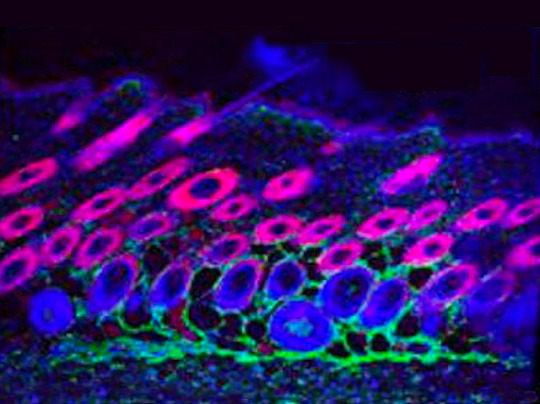#Hair Follicles
Explore tagged Tumblr posts
Text

External Force
In times of old, important people were carried high on litters. Teams of people stood beneath and worked together to heave a structure up. This collective application of force is also what happens, at a somewhat smaller scale, during hair follicle formation. Researchers have been examining the mechanical forces at play as cells move and develop when they form first a placode (a thickening in the skin’s epithelium), and then a follicle. They found that placode development is driven by forces in the surrounding tissue (pictured, with a marker of contractile proteins (top), and cell nuclei and structural keratin (blue and pink, bottom) in mouse skin tissue). The forces were strongest around, rather than within, the placode. How mechanical forces are applied, and the impact they have, is essential to healthy tissue and organ growth, so understanding this interplay could inform future treatments for disorders where tissue structure is disrupted, such as cancer, or for regenerative medicine.
Written by Anthony Lewis
Image from work by Clémentine Villeneuve and colleagues
Stem Cells and Metabolism Research Program, Faculty of Medicine, University of Helsinki, Helsinki, Finland
Image contributed by the authors under a Creative Commons Attribution 4.0 International (CC BY 4.0) licence
Published in Nature Cell Biology, February 2024
You can also follow BPoD on Instagram, Twitter, Facebook and Bluesky
20 notes
·
View notes
Text
Anybody else genuinely enjoy ripping out hair and seeing how big the root is?
2 notes
·
View notes
Text

#I can’t keep living in land of bad haircut it’s been five years#I am hot but I could be so much hotter#please#hair follicles
2 notes
·
View notes
Text
"Man idk what to draw art block sucks"
The humble hair follicle diagram:

#radiocrow#coolbeans#art#shitpost#hair follicles#traditional art#Had to submit this for school but its absolute ass 😭#IGNORE THE CHOCOLATE WRAPPER I WAS HAVING SUGAR CRAVINGS
1 note
·
View note
Text

TSRNOSS, p 556.
#hematocrit#diphosphoglycerate#atrial flutter#Marfan's syndrome#atrioventricular node#refractory period#fever#catecholamines#exercise#Beri Beri#high altitude dwellers#mountaineering#tea consumption#bronchial dilation#theophylline#Reinhold Messner#urine production#high blood pressure#electrolyte disturbances#anticoagulant#ischaemia#increse in hematocrit#omnivory#atrial fibrillation#thromboembolism#hair follicles
1 note
·
View note
Text

Learn about the Anti-hair fall serum to help reduce hair fall, reduce dandruff, helps with hair growth, increase hair volmue and much more.
Buy the Anti-Hair fall serum at Healthyr-U
#hair serum#hair growth#hair fail#hair fall solution#hair volume#dandruff#hair follicles#anti hair fall serum#hair loss
1 note
·
View note
Text
0 notes
Text
#hair transplant#hair follicle surgery cost#hair follicle#hair follicles#hair follicle surgery#hair transplant cost#fue hair transplant#hair restoration#hair transplant results#hair loss treatment
0 notes
Text
What is Laser Hair Removal?
Laser hair removal provides excellent treatment for those unhappy with shaving, waxing, or tweezing. It also benefits those who suffer from folliculitis. Shaving often causes raised pimple-like spots with folliculitis, but laser hair removal works best for this condition.
Learn more on Profile MD's Website and Schedule a Free Consultation!
0 notes
Text
Demodex on Human Skin: The Invisible Mites in Your Hair Follicles
Welcome to the fascinating world of Demodex mites, the tiny creatures that quietly inhabit the nooks and crannies of human skin. These microscopic mites are part of almost every person’s everyday life, yet they remain mostly unnoticed. Living in or near hair follicles, especially on the face, Demodex mites come in two main species that affect humans: Demodex folliculorum and Demodex brevis.…
0 notes
Text

Ahead on Hair
Maintaining healthy hair follicles and regenerating them after damage is dependent on molecules of the immune system called Toll-like receptors in hair follicle stem cells – insight for tackling hair loss
Read the published research article here
Image from work by Luyang Xiong and colleagues
Department of Neurosciences, Lerner Research Institute, Cleveland Clinic; Cleveland, OH, USA
Image originally published with a Creative Commons Attribution 4.0 International (CC BY 4.0)
Published in eLife, January 2024
You can also follow BPoD on Instagram, Twitter and Facebook
#science#biomedicine#immunofluorescence#biology#stem cells#hair#hair follicles#baldness#hair loss#toll-like receptors
10 notes
·
View notes
Text
ORGANIC BLOOD ORANGE ESSENTIAL OIL
It detoxifies the skin and removes excess oil; it also regulates sebum production and stimulates collagen development, leaving the skin bright, plump, and healthy. It naturally brightens the skin and promotes an even tone. It contains antioxidants that diminish fine lines and wrinkles. It also reverses the damage caused by damaging UV radiation. It also protects the skin from sun exposure and pollution damage. It also gives deep nutrition to alleviate dry scalp and encourage hair growth. Pure Blood Orange Essential Oil gently nourishes the scalp and stimulates hair follicle development. It's also high in antioxidants, which protect against free radicals and encourage hair development.

#finelines#reduce wrinkles#uv damage#usda certified#essential oil#hair follicles#free radicals#nourished scalp
0 notes
Text
Nourish Your Roots: The Vital Role of Scalp Care in Hair Growth
Healthy, luscious hair starts at the root—literally. Often overlooked, scalp care is a fundamental aspect of hair health that can significantly influence hair growth. A well-maintained scalp ensures a thriving environment for hair follicles, leading to stronger, healthier hair. In this blog post, we will explore the importance of scalp care for hair growth and provide practical tips to maintain a…
#call care#dandruff#Hair#hair breakage#hair care#hair follicles#hair growth#hair loss#healthy#scalp#sebum production
0 notes
Text
How Many Hair Follicles (Grafts) Do You Need?
Choosing a qualified specialist for determining and executing the right number of hair follicles for your hair transplant is crucial to achieving successful and satisfactory results. A skilled and experienced hair restoration specialist not only assesses the extent of your hair loss accurately but also devises a personalized treatment plan tailored to your individual needs and goals.
The specialist’s expertise plays a pivotal role in determining the optimal number of follicles needed to achieve natural-looking hair restoration. They consider factors such as the quality and density of donor hair, the desired hairline design, and the overall aesthetic outcome.
0 notes
Text
Biotic DHT Blocker: A Solution for Hair Fall and Male Pattern Baldness
Hair loss is a common concern for many men, often resulting in a significant impact on self-esteem and confidence. Male pattern baldness, also known as androgenetic alopecia, is the most prevalent form of hair loss among men. It is primarily driven by a genetic sensitivity to dihydrotestosterone (DHT), a derivative of testosterone. Fortunately, advancements in hair care have led to the development of biotic DHT blockers, offering a promising solution for combating hair fall and male pattern baldness.
Understanding Male Pattern Baldness
Male pattern baldness typically begins with a receding hairline and thinning at the crown. Over time, the hair loss progresses, potentially leading to partial or complete baldness. The root cause of this condition lies in the action of DHT on hair follicles. DHT binds to androgen receptors in the hair follicles, shrinking them and shortening the hair growth cycle. This results in thinner, shorter hairs that eventually stop growing altogether.
The Role of DHT Blockers
DHT blockers work by inhibiting the production or action of DHT, thereby protecting hair follicles from its damaging effects. By reducing DHT levels, these blockers can slow down, halt, or even reverse hair loss. There are two main types of DHT blockers: synthetic and biotic (natural).
Benefits of Biotic DHT Blockers
Biotic DHT blockers are derived from natural sources such as plants, herbs, and minerals. They are increasingly favored for their safety, minimal side effects, and holistic approach to health. Key ingredients often found in biotic DHT blockers include:
Saw Palmetto: Extracted from the fruit of the Serenoa repens plant, saw palmetto is one of the most well-known natural DHT blockers. It inhibits the enzyme 5-alpha-reductase, which converts testosterone to DHT, thereby reducing DHT levels in the scalp.
Pumpkin Seed Oil: Rich in nutrients and fatty acids, pumpkin seed oil is another effective DHT blocker. It is believed to inhibit DHT production and promote overall scalp health.
Green Tea Extract: Green tea contains catechins, which are potent antioxidants. These catechins can inhibit the action of 5-alpha-reductase, thereby reducing DHT levels and promoting hair growth.
Pygeum Bark: Derived from the African cherry tree, pygeum bark extract has been used traditionally for its anti-inflammatory properties. It also helps reduce DHT levels in the scalp.
Nettle Root: Nettle root extract is known for its ability to inhibit the binding of DHT to hair follicle receptors, thus preventing hair loss.
Efficacy and Usage
Biotic DHT blockers can be used in various forms, including supplements, shampoos, conditioners, and topical treatments. When selecting a biotic DHT blocker, it's important to choose products with high-quality, standardized extracts to ensure efficacy. Consistent use over several months is typically required to see noticeable results, as hair growth is a slow process.
While biotic DHT blockers can be highly effective, they work best when combined with a comprehensive hair care routine. This may include maintaining a healthy diet rich in vitamins and minerals, regular scalp massages to improve blood circulation, and avoiding harsh hair treatments that can damage the follicles.
ConclusionMale pattern baldness can be a challenging condition to manage, but biotic DHT blockers offer a natural and effective solution for reducing hair fall and promoting hair growth. By targeting the underlying cause of hair loss and nurturing overall scalp health, these natural remedies provide a holistic approach to maintaining a full and healthy head of hair. With consistent use and proper hair care practices, men experiencing hair loss can regain confidence and enjoy the benefits of a more robust, healthier mane.

#Biotic DHT Blocker#Hair Fall control solution for Men#Hair Loss Treatments for Men#Hair Fall#Hairfall control#hair fall#hair fall in Men#Hair Follicles#Hair Growth#Hair Fall Control#Hair Fall Male Pattern Baldness#Male Pattern Baldness
0 notes
